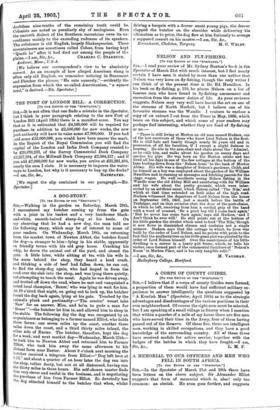NELSON AND FLY-FISHING.
[TO THE EDITOR OP TEE 'SPECTATOR:]
SIR,—I read your review of Mr. Sydney Buxton's book in the Spectator of March 21st with much interest, but I feel nearly certain I have seen it stated by more than one author that Nelson was very keen on fly-fishing, though the only writer I can think of at the present time is Dr. Ed. Hamilton. In his book on fly-fishing, p. 110, he places Nelson on a list of famous men who have found in fly-fishing amusement and recreation from the sterner duties of life. As your reviewer suggests, Nelson may very well have learnt the art on one of the streams of North Norfolk, but I believe one of his favourite streams was the Wandle. I venture to enclose a copy of an extract I cat from the Times in May, 1888, which bears on this subject, and which some of your readers may perhaps find interesting, whether they are fond of fly-fishing or no:— "There is still living at Merton an old man named Hudson, one of the last survivors of those who knew Lord Nelson in the flesh. He is still hale and hearty though nearly 90 years old and in possession of all his faculties, if I except a slight dulness in hearing. He sits in the arm-chair and chats about the Admiral, as he calls him, and walks about his garden on sunny days and smokes his pipe. He was born on the Merton estate and has lived all his days in one of the few cottages at the bottom of the lane leading down from the Nelson Arms' to the back of Merton Abbey. His wife was a daughter of Nelson's gardener, Cribb, and he himself as a boy was employed about the garden of Sir William Hamilton and in running on messages and fetching parcels for the stage wagon. He well recollects seeing Nelson fishing in the Wandle near the old Abbey Mill and sauntering with Sir William and his wife about the pretty grounds, which were inter- sected by an artificial canal, which Nelson called The Nile, and which at that time extended on both sides of the high road. Hudson witnessed the departure of Lord Nelson from the house on September 13th, 1805, just a month before the battle of Trafalgar, and on that occasion shut the door of the post-chaise, in which he left, receiving from him a cordial grip of the hand with a word of counsel, " Be a good boy till I come back again.'
But he never has come back again,' says old Hudson, "and I don't think he ever will.' He still points out at the bottom of his little garden the rivulet which used to feed 'The Nile,' though it now flows in diminished stream and contains not a single minnow. Hudson says that the cottage in which he lives was built by the order of Lord Nelson, and he points with pride to the fact that the mulberry tree on his little grass plot was planted by the order of Lord Nelson himself. Over the mantelpiece of his little dwelling is a mirror in a heavy gilt frame, which, he tells his visitor, once formed part of the ornamental furniture of ' Nelson's Room' in Merton Place, and is his only tangible relic."
—I am, Sir, &c., M. VAUGHAN.
Haileybury College, Hertford.


























































 Previous page
Previous page